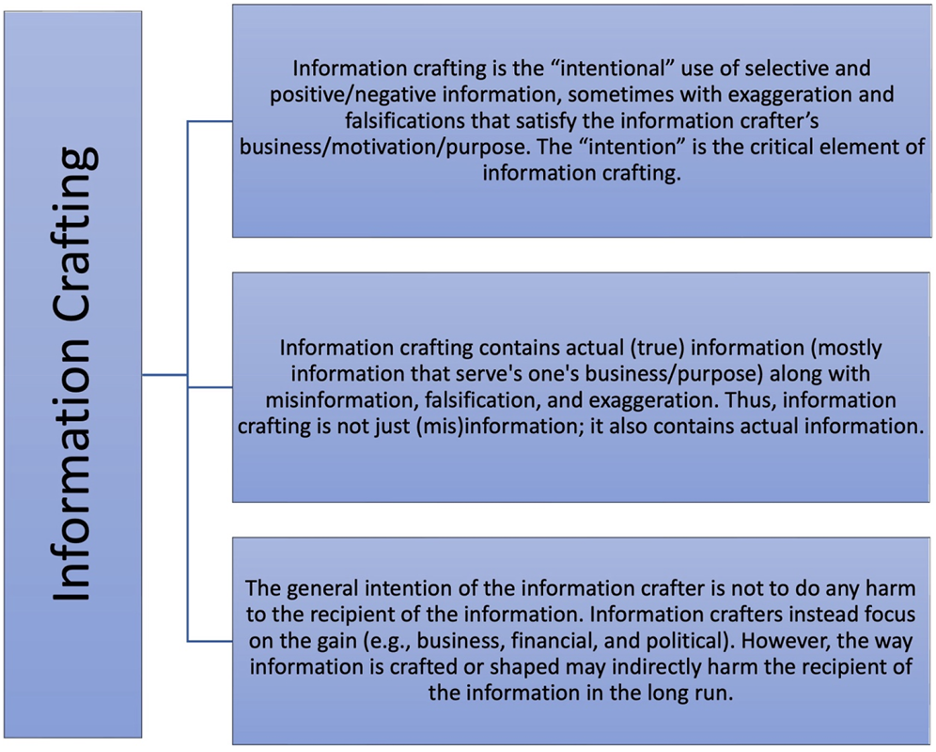Misinformation, Disinformation, or Information Crafting?
Misinformation, Disinformation, or Information Crafting?
Nafiz Zaman Shuva
I have long been thinking of writing this piece for Information Matters. As many countries, including Australia, Canada, and the U.S., regularly welcome immigrants with diverse backgrounds, it is essential to understand whether immigrants moving to a new country can make informed decisions by consulting formal information agencies such as the immigration ministry. What information sources do immigrants consult to gather information about their life in a new country? How helpful are they in making informed decisions about life in their host country? What information is shared with immigrants by formal information agencies such as the immigration consultants?
—selective information sharing, mainly positive information, sometimes with exaggeration and falsifications—
My recent research on pre-arrival information experiences among Bangladeshi immigrants shows that immigrants consult various formal and informal information sources in the pre-arrival context, including friends and family networks, social media sources, and immigration agents. The core focus of my paper was on the information experiences of immigrants consulting formal information sources such as immigrant agencies. It is evident in my study that using immigration agents and government information sources was not always helpful for Bangladeshi immigrants in making informed decisions about their lives in Canada. Some immigration consultants in Bangladesh portrayed life in Canada as heavenly and did not share information about the initial settlement challenges immigrants face, including employment-related settlement challenges. The mismatch between immigrants’ expectations of life in a pre-arrival context and their actual experience after arrival was enormous. This was partly due to the lack of information about the reality of life for newcomers.
The study on the pre-arrival information experiences highlighted the danger of selective information-sharing practices of formal agencies such as immigration consultants, often exaggerated and false information about life abroad. These agencies may portray life abroad as heavenly and less stressful to attract more clients to their agencies. The “information crafting” concept I constructed may help understand various agencies’ information-sharing practices, including immigration agents. I defined “information crafting” “as selective information sharing, mainly positive information, sometimes with exaggeration and falsifications. In the context of immigration, information crafting is performed by information providers who deliberately select and share information to satisfy their business/purposes.”
Source: Shuva, 2024
Immigration consultants (including many unauthorized consultants) in developing countries such as Bangladesh and India may present information that includes inaccurate or misleading statements and unfulfilled promises. In contrast, government agencies like IRCC highlight the advantages and opportunities for newcomers. The information shared by immigration ministries such as IRCC may be focused more on positive information about life in Canada (for example, employment opportunities and free healthcare) over comprehensive information about life in Canada (for example, the challenges newcomers may face findings suitable employment; issues with healthcare such as not being able to get a family physician). So, it’s not always misinformation or disinformation shared with immigrants that is harmful; in many cases, it is “information crafting” that may significantly affect newcomers’ settlement in a new country. I think through the lens of “information crafting” it may be possible to evaluate the information sharing practices of formal information agencies such as immigration ministries. As countries like Australia, Canada, and the U.S. regularly welcome immigrants with diverse socioeconomic backgrounds, including highly skilled professionals, these agencies must share comprehensive, accurate, and helpful information that helps newcomers make informed decisions about their lives in the host country. I think an ethical migrational information system should offer information about the positive and negative aspects of immigration. It should prepare newcomers to face the reality of life after arrival in their host country.
See Shuva, N. Z. (2023). “They act like we are going to heaven”: Pre-arrival information experiences, information crafting and settlement of immigrants in Canada. Journal of Documentation, 80(7), 1-24. https://doi.org/10.1108/jd-05-2023-0082
Cite this article in APA as: Shuva, N. Z. Misinformation, disinformation, or information crafting? (2024, March 21). Information Matters, Vol. 4, Issue 3. https://informationmatters.org/2024/03/misinformation-disinformation-or-information-crafting/
Author
-

Dr. Nafiz Zaman Shuva is an Assistant Professor at Queens College, City University of New York (CUNY). He holds an MA in Information Science and Library Management from the University of Dhaka, Bangladesh, an international master’s degree in Digital Library Learning from three European institutions in Norway, Estonia, and Italy, and a Ph.D. in Library and Information Science from the University of Western Ontario, Canada. His current teaching and research center around information behavior of equity-deserving groups such as migrants, social media, public libraries, and scholarly communication.
View all posts






